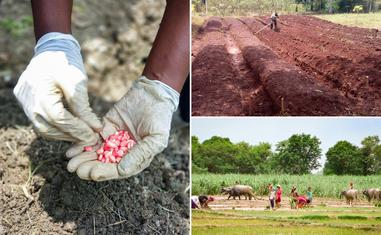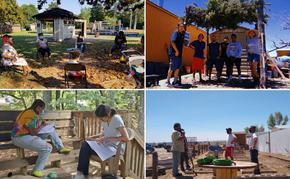Each year, tens of thousands of people from Africa travel to Europe to work alongside a declining national agricultural workforce on farms in EU member states in an industry that is increasingly becoming dependent on migrant seasonal workers.
When the pandemic disrupted international travel in April 2020, the spring harvest throughout Europe was thrown into jeopardy, revealing the extent of the EU’s reliance on seasonal workers and their difficult living conditions. Additionally, the pandemic has brought renewed attention to economic crises, the loss of land by farmers, and other factors that are driving people to leave rural areas in Africa.
“The way that agricultural affairs are organized is not sustainable or equitable, be it in Europe, Africa, or anywhere else in the world. There are fundamental questions that need to be closely examined in the light of principles such as the oneness of humanity,” said Rachel Bayani of the Brussels Office of the Baha’i International Community (BIC) at an online seminar held by the Office last Wednesday.
The gathering is part of a seminar series, co-hosted by the Brussels Office and the Food and Agriculture Organization of the United Nations (FAO), which brings together policymakers, academics, and civil society organizations from Europe and Africa to explore the relationship between agriculture, rural sustainability, and migration, particularly in the context of partnerships between the two regions.
Rodrigo de Lapuerta, Director at the Liaison Office in Brussels of the FAO, spoke about the novel approach of the seminars: “FAO estimates that 80% of all moves involve rural areas. Migration and rural transformation, with the sustainability of agri-food systems, are totally interrelated. However, I do not think these two issues have often been treated jointly.”
Attendees at the gatherings have highlighted different aspects of the links between migration and agriculture. “Many factors influence why and how people migrate from rural areas … [but] it is essential that this migration is done out of choice, rather than necessity,” said Mr. Ola Henrickson, Regional Director at the International Organization for Migration (IOM).
A particular focus of the most recent seminar was on the viability of EU’s agricultural sector and the need for rethinking production systems.
“We have to remember that our food security depends on the respect of our agri-food workers’ rights,” said Maximo Torero Cullen, the FAO’s Chief Economist, at a recent gathering. “The pandemic has shown us how indispensable migrants are … but it has also rightfully put the spotlight on the poor working and living conditions in the [agricultural] sector and the invisibility of these workers.”
Dr. Torero Cullen and other participants emphasized that policies of African and European states and regional bodies aimed at building sustainable food and agriculture systems need to put at the center the interests, safety, and well-being of agricultural workers.
“Many EU Member States frame their seasonal worker schemes primarily in terms of meeting labor-market needs at home,” said Camille Le Coz of the Migration Policy Institute of Europe. But she highlighted that some countries are looking at other approaches, including framing migration policies around “co-development” — creating arrangements that are beneficial to the sending and receiving countries as well as the workers themselves.
Reflecting on the gathering, Mrs. Bayani states: “Our current economic and agricultural systems and their implications for migration, the environment, nutrition, and livelihoods need to be closely examined. The Baha’i teachings offer insights that can be helpful in this conversation: that the question of economics should begin with the farmer, because the farmer ‘is the first active agent in human society.’ This idea can allow us to explore possibilities for different ways to look at production systems.”
She continues: “The issues discussed at these seminars reflect only some of the profound questions before humanity. The Baha’i teachings envisage that every element of society, including economic relations, will have to undergo a profound transformation in the light of the essential principle of the oneness of humanity.”
Future seminars over the coming months will continue to look at agriculture and migration, focusing on topics such as education and the future of villages.

















Comments
Sign in or create an account
Continue with Facebookor